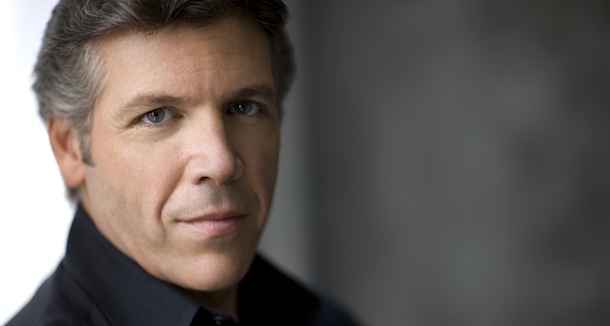 |
| Thomas Hampson, baritone |
I'm late with an appreciation of last weekend's appearance by Thomas Hampson at Celebrity Series (who wrap their season this month with the annual Alvin Ailey visit, btw). And as usual, when I've been dragging my feet, it's because I've got bad news. The great baritone was in fine voice, mind you - and his co-stars for the evening, the Jupiter String Quartet, likewise made a strong impression.
It was their program that didn't quite enthrall me. It featured an appealing, but early, Schubert quartet - as well as an exquisite Webern piece which the Jupiters played superbly. But the centerpiece of the concert - and a New England premiere - was Mark Adamo's setting of Billy Collins' Aristotle, which proved a strange misfire; and the program wrapped with a series of Hugo Wolf lieder that felt like one long appetizer rather than a main course.
On the other hand, it was wonderful just to hear Hampson (if only we could attract him to the Hub for a full operatic performance!). At 57, this lyric baritone hasn't lost his elegant, maple-hued timbre (nor his personal elegance, either), and his sound is still of striking size - indeed, the very walls of Jordan Hall often vibrated in resonance with his power chords (as it were); Hampson might need a microphone in Gillette Stadium, but that's about it.
He also exuded a collegial, collaborative spirit with the Jupiters, who were actually the first to take the stage, with Schubert's Quartet No. 10 in E-Flat. Written when the composer was all of sixteen, the piece pushes at the limits of Haydn with brilliant exuberance. The Allegro is stuffed with sweetly singing lines, while the Adagio is a gently rocking lullaby, and the Scherzo all but kicks up its heels. We can feel the adolescent Schubert showing us everything he can do, which consistently charms; but the final effect is diffuse (if virtuosic). Still, the Jupiters gave a sympathetic, insightful account of the piece, and aptly captured its many colors and moods (particularly when violinist Nelson Lee was in the lead).
The quartet was even more impressive, however, in Anton Webern's far-more-unified Langsamer Satz, ("Slow Movement") another slightly "junior" piece, as it was completed in the shadow of Schoenberg (Webern's teacher) rather than Haydn. Indeed, Langsamer Satz so clearly echoes Transfigured Night in its structure and thrust that you could almost call it Transfigured Lite. That doesn't dull its own haunting appeal, however, and the Jupiters essayed its lush melancholy with remarkable sensitivity.
Then Hampson arrived, for Mark Adamo's Aristotle, set to the poem of the same name by former poet laureate Billy Collins. Now Collins - and his poetic voice - are known and admired quantities, I'd say; indeed, Collins proved one of the most widely read of poet laureates precisely because his approach - populist, sympathetically bemused, lightly ironic - is so accessible to the public at large.
But not to composer Mark Adamo, apparently, who seems to have imagined that Aristotle - which gently ribs that philosopher's pronouncements on high drama through a catalogue of "beginnings," "middles" and "ends" in the comical/tragical mix that makes up actual life - is the equivalent of The Waste Land, or perhaps September 1, 1939. Thus the composer supplied an appealingly sophisticated setting whose anxious modernist tone was utterly inappropriate to the text, and misled Hampson into some curious histrionics (and the wrong kind of parody). I might trust Adamo with Larkin's Aubade; but I have to say Aristotle counts as the oddest misinterpretation of a text by a composer I've ever heard; indeed, Adamo and Collins only came into alignment at the very last minute, when Collins conjures a closing image of death in "outside a cabin, falling leaves."
Oh, well! The second half of the concert was devoted to Hugo Wolf, whose shining success at the end of the nineteenth century has perhaps dimmed as the years have gone by. Still, Hampson and the Jupiters had some of his strongest stuff on offer: the instrumental Italian Serenade (a charming trot through Tuscany, which encounters a few storm clouds but chases them away), and a suite of six songs mostly drawn from the Mörike-Lieder (named after their texts by Eduard Mörike), which was composed in a remarkable artistic burst in Wolf's late maturity (originally for voice and piano, but persuasively re-configured here for string quartet). The Mörike-Lieder retain their appeal, although the texts are mostly standard-issue (German bachelor wanders through the beauty of der Wald, etc.), and while Wolf almost equals, he never quite surpasses Schubert and Schumann. Still, the best song here conceals a surprising sting, which draws from Wolf his best music: in "Auf ein Altes Bild" ("To an Old Picture"), the poet imagines the Virgin and Child at play in "a green landscape," in which "the stem that will become the cross" is already growing, and waiting for them.
There was a happy surprise from Wolf in the encore, too - his “Die Rattenfänger,” ("The Rat-Catcher"), set to Goethe's wicked poem to the Pied Piper of Hamelin. Hampson sang this frisky, unforgettable little number with diabolical wit, and the Jupiters struck just the right note of gleeful malice. It may be the best song Wolf ever wrote, and it was certainly the most captivating performance of the evening.
There was a happy surprise from Wolf in the encore, too - his “Die Rattenfänger,” ("The Rat-Catcher"), set to Goethe's wicked poem to the Pied Piper of Hamelin. Hampson sang this frisky, unforgettable little number with diabolical wit, and the Jupiters struck just the right note of gleeful malice. It may be the best song Wolf ever wrote, and it was certainly the most captivating performance of the evening.
No comments:
Post a Comment